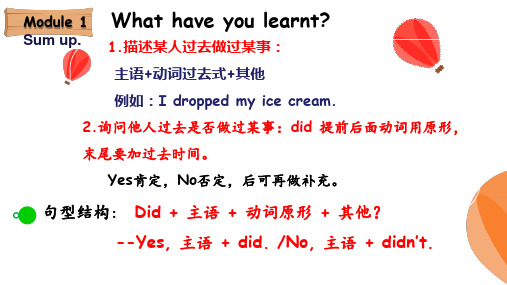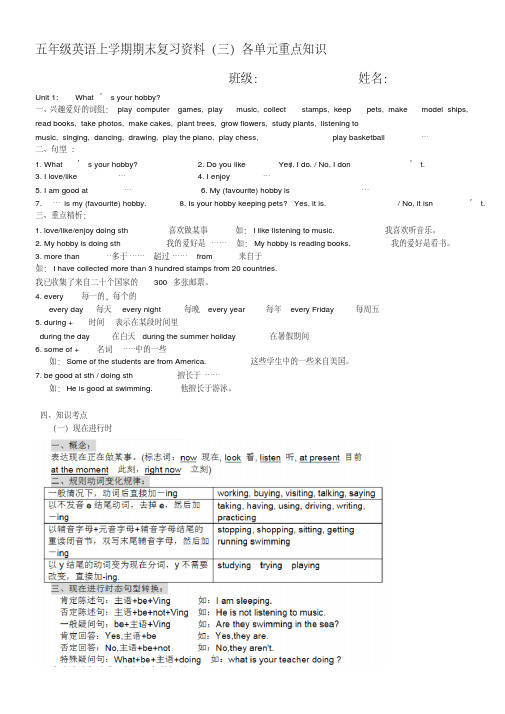2020五年级上册英语期末复习知识点总结
- 格式:doc
- 大小:426.00 KB
- 文档页数:11


Unit1 My future 一、单元单词(13个)future 将来;未来want 想要pilot 飞行员teach 教(课)cook 厨师;烹饪taxi driver 出租车司机job 工作;职业singer 歌手fall 掉落;落下lifeguard 救生员save 救;救助;节约become 变成;变得(be) good at 擅长二、重点句子:Listen and say1.What do you want to be, children?1.同学们,你们想做什么职业?2.I want to be a pilot.2.我想成为一名飞行员。
I want to fly a plane in the sky.我想开飞机。
3.I want to be a doctor.3.我想成为一名医生。
I want to help people.我想帮助人们。
4.I want to be a teacher.4.我想成为一名老师。
I want to teach English in a school.我想在一所学校教英语。
5.I want to be a cook.5.我想成为一名厨师。
I want to cook nice food.我想做好吃的食物。
Read a storyFroggy’s new job青蛙的新工作1.Froggy wants to be a pilot.1.青蛙想成为一名飞行员。
He wants to fly a plane, but he is afraid of flying.他想开飞机,但他却害怕飞翔。
Help! Help! It’s too high!救命啊!救命啊!这太高了!2.Froggy wants to be a singer, but he is not good at singing.2.青蛙想成为一名歌手。
但他并不擅长唱歌。
3.One day, a chick falls into the lake!3.有一天,一只小鸡落入湖中!Help! A lifeguard jumps into the lake.救命啊!一位救生员跳入湖中。


五年级英语上学期期末复习资料(三)各单元重点知识班级:姓名:Unit 1: What’s your hobby?一、兴趣爱好的词组:play computer games, play music, collect stamps, keep pets, make model ships, read books, take photos, make cakes, plant trees, grow flowers, study plants, listening tomusic, singing, dancing, drawing, play the piano, play chess, play basketball…二、句型:Yes, I do. / No, I don’t.1. What’s your hobby?2. Do you like…?3. I love/like…4. I enjoy …5. I am good at…6. My (favourite) hobby is …7. …is my (favourite) hobby. 8. Is your hobby keeping pets? Yes, it is. / No, it isn’t.三、重点精析:1. love/like/enjoy doing sth 喜欢做某事如:I like listening to music. 我喜欢听音乐。
2. My hobby is doing sth 我的爱好是……如:My hobby is reading books. 我的爱好是看书。
3. more than…多于…… , 超过…… from 来自于如:I have collected more than 3 hundred stamps from 20 countries.我已收集了来自二十个国家的300多张邮票。
4. every 每一的,每个的every day 每天 every night 每晚 every year 每年 every Friday 每周五5. during + 时间表示在某段时间里during the day 在白天 during the summer holiday 在暑假期间6. some of + 名词……中的一些如:Some of the students are from America. 这些学生中的一些来自美国。

小学英语五年级上册知识点汇总大全1. 语法(1) 动词时态五年级上册英语中,提到的动词时态主要有以下几种:•现在进行时:构成方式为“be动词 + V-ing”,表示现在正在进行的动作;•一般现在时:动词原形,表示经常发生或者习惯性动作;•现在完成时:构成方式为“have/has + 过去分词”,表示已经完成的动作;•一般过去时:动词过去式,表示过去的某个时间发生的动作;•过去进行时:构成方式为“was/were + V-ing”,表示过去某个时间正在进行的动作;•将来时态:will/shall + 动词原形(表示说话者的意图)或be going to + 动词原形(表示自己的计划或有迹可循的事实)。
(2) 名词复数有些名词在表示复数时,需要做出一些变化。
•在单词后添加s。
例如:book - books,desk - desks;•对以s, x, ch, sh等结尾的名词,加es。
例如:bus - buses,box - boxes;•对以辅音字母+y结尾的名词,去y加ies。
例如:baby - babies;•对以o结尾的名词,加es或者只加s。
例如:potato - potatoes,photo - photos。
(3) 疑问句疑问句是英语语法中的一个重要组成部分。
在五年级上册的教材中,疑问句主要包括以下类别:•Yes/No疑问句:用于询问能否回答“是”或者“否”的问题。
例如:“Do you like this book?”;•选择疑问句:用于提供两个或以上选项供选择。
例如:“Do you like apples or oranges?”;•疑问代词:用于询问某个具体的事物、人或者时间等。
例如:“What time is it?”;•特殊疑问句:以特殊疑问词(如:what, when, where, why, how)开头的句子,用于询问特定的事项。
例如:“What do you want for breakfast?”。

外研版五年级英语(yīnɡ yǔ)上册期末(qī mò)复习资料八大攻略(ɡōnɡ lüè)攻略....(.ɡō..n.ɡ. l.üè..).一:常见特殊.....、.whose.....、.how...等引导...、.where.......(t..è.sh..ū.).疑问句(由疑问词........when....、.what....、.who1.When.... did you come back? We came back last Sunday.2.What....did you do at the weekend? I visited lots of places.3.Where..... did you go last Sunday ? We went to the British Museum.4.How many........bananas/oranges do you want? Six,please.5.How much....... cheese do you want ? Half a kilo.7.What time........do you get up ? I get up at half past seven.8.What.... does school start? My school starts at 9 o’clock.....time9.What can you do?I can sing well.10.Whose.....bag is this ?It’s Lingling’s bag.11..How... did you go? I went by bike.12.What....do you want ? I want a skirt.13.What.... are you going to do? We’re going to have lunch together.14..What....’s the matter?Nothing.15.What.... are we going to take on our picnic?Let’s make a list.16.What.... are you thinking about? It’s a secret’攻略二:....常见一般疑问句及其回答(用yes或no来回答)1.Are you feeling sad?2.Did they buy ice cream?Yes,they did./No,they didn’t.3.Can we have a dog,please? No,we can’t.4.Did you wash Lingling’s T-shirt?Did Lingling like it ?Did he go to London? Yes,he did./No,he didn’t.5Do you like cheese? 6.Do you miss China?7.Do you skip in the playground? Do you walk to school? Do you skip in the playground?8.Do you want to play chess? 9.Do you feel tired?10.Do you want to be in our football team? 11.Do you live in London ,too?Yes, I do./ No, I don’t.12.Can you catch the ball well?Yes,I can.13.Are you good at table tennis?Yes,I am./No,I’m not.14.Is this Sam’s T-shirt? Yes,it is./No,it isn’t.15.Are there enough chair? Yes,there are./No,there aren’t.16.Is he feeling sad?17.Can she control the ball well? No,she can’t.18.Can I be a goalkeeper?Yes,you can./No,you can’t.攻略..(.ɡō..n.ɡ. l.üè..).三:..动词(dòngcí)第三人称单数/一般过去时1.She plays.....football very badly...... football very well.2.He plays3.He jumps....very fast......very high. 4.She runs5.Lingling wants.....to go to school with Amy.6.They took....to the classroom.....photos of the mountains. 7.Then we went8.Today I helped...... my grandfather.9.I dropped....... my ice cream. 10.Yesterday I went....to the park with sam and Amy.11.I went....my T-shirt..... to the zoo by bus. 12.Sam took13.Then we went...... ice creams.....by bus. 14.We bought14.I went... lots of places.....to the park. 15.I saw16.I went......twenty-five pencils yesterday.....home by bus. 17.I bought攻略(ɡōnɡ lüè)四:There be 句型(jù xínɡ)1.There are too many books on the desk.2.There are too many apples in the bag.3. There is not enough time. There is only one hat.4.There are enough pencils.5.There are not enough cars.6.There are too many people.7.There are ten pencils in the blue box.攻略(ɡōnɡ lüè)五:人称代词宾格:him/her/me/them/it 名词性物主代词:mine/hers/his/yours1.This man is blind.He can’t see.This dog helps him....2.This girl is deaf.She can’t hear.This dog helps her.....3.These firemen can’t find people. These dogs help them......4.This little girl can’t swim. Her mother helps her... ..5.This is my hat.It is mine............6.This is your T-shirt.It is yours.7.That is his big coat .It is his......... 8.This is her sweater.It is hers.攻略六:....Should、shouldn’t、can、can’t、could、couldn’t之后用动词原形,词形不变35.You should.... eat fruit/apples.......look,then cross the road. You sh..ouldYou should...... say hello to my friends....... take the right child.You shouldYou shoul.....d hold my hand,too.36.You shouldn.......’.t. jump on the bed........’.t .walk in the road. You shouldn37.I can ...do it very well. She was three then.She couldn ......’.t . swim. When I was two years old. I could laugh. I couldn ......’.t . run.攻略..(.ɡō..n .ɡ. l .üè..).七.: 形容词:happy/sad/tired/bored/angry/hungry/thirsty1. Can I have some water?I ’m thirsty.2. I ’ve got a present.I ’m happy.3.I lost my favourite toy. I ’m sad.4. I want to eat a hamburger.I ’m very hungry.5.Can we play chess?I ’m bored.6.I played basketball.I ’m so tired.7.Today I won a chess game.Now I feel happy.8.Yesterday I lost my bag.I can ’t find it. I feel sad.9.I can smell some nice noodle soup. I feel hungry.10.It ’s raining and I can ’t go out to play.I feel bored.攻略..(.ɡō..n .ɡ. l .üè..).八.:.不规则过去.....(gu ...ò.q .ù.).式. drop-dopped do-did come-came go-went meet-met buy-bought run-ran have-had eat-ate see-saw watch-watched win-won is-was are-were take-took get-got have-had内容总结(1)外研版五年级英语上册期末复习资料八大攻略 攻略一: 常见特殊疑问句(由疑问词when 、what 、who 、where 、whose 、how 等引导 1.When did you come back (2)9.Do you feel tired。
五年级英语上册期末知识要点复习第一模块一、重点短语:1.in London在伦 2.be back from从……回来 e back回来 st Sunday上星期天 5.live in住在 6.look at看7.ice cream冰激凌e with与……一起9.hurry up赶快10.wait for等待11.by bus乘坐公交车12.Chinese friends中国朋友e with us和我们一起来吧。
14.Wait for me等等我!二、重点句型:1、询问某人是否做过某事:Did+主语+动词原型+其他?肯定回答:Yes,主语+did.否定回答:No,主语+didn’t.例句1:Did you walk to school?(你步行去学校么?)---肯定回答:Yes,I did.---否定回答:No,I didn’t.例句2:Did he come back yesterday?(他昨天回来了吗?)---肯定回答:Yes,he did.---否定回答:No,he didn’t.二、with加某人放在后面(人称要用宾格):表示与.......一起如:I went to school with Sam.(我和sam一起去学校)例句:When did you come back with Sam?(你和sam什么时候回来?)---------I came back with Sam yesterday.(昨天我和sam回来的。
)三、动词过去式:come--came(来)go--went(去)meet--met(遇到)buy--bought(买)drop--dropped(使掉落)run--ran(跑)see--saw(看见)walk--walked(走路)send--sent(邮寄)eat--ate(吃)live--lived(居住)have--had(有)do--did(做,助动词)第二模块一、重点短语: 1.shopping list购物单 2.how many多少(可数名词复数)3. half a kilo半公斤4.how much多少(不可数名词)5. one kilo of noodles一公斤面条6.make a list做一个清单7. go to the supermarket去超市8.the first thing第一件事9. five bottles五瓶10.here you are给你11.all right 好吧二、重点句型1.How many+可数名词复数+did you buy?对可数名词的数量提问。
------精选范文、公文、论文、和其他应用文档,如需本文,请下载----- 1 2020五年级上册英语期末复习知识点总结 学科: 英语 任课教师: 李老师 授课时间:2020年 11月 27日9:00 – 11:00
姓名 年级: 五年级 教学课题 英语知识点梳理 阶段 基础(√ ) 提高( √) 强化( ) 课时计划 第( 1)次课 共( )次课 教学 目标 知识点:掌握重点句子及全册语法点
方法:知识点拨 习题讲解
重点 难点
重点:熟练运用单词和句子
难点: 掌握语法点,能解决特殊考点
教 学 内 容 与 教 学 过 程
课前 检查 作业完成情况:
优□ 良□ 中□ 差□ 建议__________________________________________ .新版PEP五年级上册知识点总结 Unit 1 重点单词old 老的,年纪大的 young 年轻的,岁数不大的 funny 滑稽的,可笑的 kind 体贴的,慈祥的,宽容的 strict 要求严格的,严厉的 polite 有礼貌的,客气的 shy 羞怯的,腼腆的,怕生的 helpful 有用的,愿意帮忙的 clever 聪明的,聪颖的 hard-working 工作努力的,辛勤的 music 音乐 art 美术 science 科学 English 英语 maths/math 数学 Chinese 语文,中文 sometimes 有时,间或 robot 机器人 speak 会说,会讲(某种语言);用(某种语言)说话 重点句子 1. —Who’s your art teacher? 谁是你的美术老师? —Mr. Jones.琼斯老师。 2. —Is he young? 他年轻吗? —Yes, he is. 是的,他年轻。 —No, he isn’t. 不,他不年轻。 3. —What’s Wu Yifan like? 吴一帆怎样? —He’s hard-working. 他很勤奋。 4. Ms Wang will be our new Chinese teacher. 王老师会成为我们的新语文老师。 5. He is very helpful at home. 他在家很能干。 6. Robin is short but strong. 罗宾个子矮,但是身体强壮。 7. He can speak Chinese and English. 他会说中文和英语。 8. He makes me finish my homework. 他让我写作业。 语 音 字母y在单词中的发音:1、双音节或多音节词末发[ i ]。 例:baby happy windy sunny sorry candy many family ------精选范文、公文、论文、和其他应用文档,如需本文,请下载----- 2 party 婴儿 开心的 有风的 晴朗的 对不起 糖果 许多 家庭 聚会 课外补充:2、y在单音节词末发[ ai ] 例:by 乘坐 my 我的 why 为什么 cry 哭 fly 飞 重点知识及语法 1、询问他人的外貌或性格:-What’s he/she like? - He/She is kind/… 2、一般疑问句的问与答:—Is he/she…?—Yes, he/she is. —No, he/she isn’t. —Do you know…? —Yes, I do. —No, I don’t 3、be动词的三种形式am, is, are与人称代词连用的用法: I + am, He, she, it,人名、物名+ is We, you, they + are 4、Ms., Miss, Mr., Mrs.的区别: Ms. [miz](缩略词)(用于女子的姓氏或姓名前,不指明婚否)女士; Miss [mis](用于未婚女子的姓氏或姓名前,以示礼貌)小姐,女士; Mr. [mist](mister的缩略词)(用于男子的姓氏或姓名前)先生; Mrs. [misiz](用于已婚女子的姓氏或姓名前)太太;夫人。 5、and和but的区别: and “和,与”,表并列关系 He is tall and thin. 他又高又瘦。 but “但是”,表转折关系 He is short but strong. 他个子矮,但是身体强壮。 重点作文 1、介绍自己、朋友或老师等熟悉的人物,如:My …teacher/friend/…。 思路导引 (1)开头:交代人物的身份 I have a/an…He/She is… (2)中间:1)体貌 He/ She is tall/strong… He/She has …hair/eyes… 2)性格 He/She is strict/kind… 3)爱好 He/She likes playing pingi-pong/… 或He/She often read books/… on the weekend. (3)结尾:评价人物或抒发对人物的情感 I like him/her very much. 2、范文:(1)课本P9 Read and write (2) My Chinese teacher I have a new Chinese teacher. She is Ms. Chen. She is tall and thin. She has big eyes and long black hair. She is kind and funny. Sometimes she is strict, too. She is hard-working. She likes reading. Her class is so much fun. We all like her. Unit 2 重点单词Sunday (Sun.) 周日 Monday (Mon.) 周一 Tuesday (Tue./Tues.) 周二 Wednesday (Wed./Weds.) 周三 Thursday (Thur./Thurs.) 周四 Friday (Fri.) 周五 Saturday (Sat.) 周六 weekend 周末(周六、日) wash my clothes 洗衣服 watch TV 看电视 do homework 做作业 read books 看书 play football 踢足球 on the weekend 在周末 play sports/do sports 做体育运动 listen to music 听音乐 play ping-pong 打乒乓球 重点句子 1. —What do you have on Thursdays? 星期四你们上什么课? —I have math, English and music. 我们上数学、英语和音乐课。 2. —What do you do on Thursdays, Grandpa? 爷爷,星期四你要做什么? —I have a cooking class with your grandma. 我和你奶奶去上烹饪课。 3. —Do you often read books in this park? 你经常在这个公园看书吗?
识记口诀:我用am, 你用are, is用于他、她、它,所有复数都用are。 ------精选范文、公文、论文、和其他应用文档,如需本文,请下载----- 3 —Yes, I do. 是的 —No, I don’t. 不是 4. Look at my picture. 看我的图片。 5. You look tired. 你看 起来很累。 6. You should play sports every day. 你应该每天做运动。 语 音 字母组合ee, ea在单词中的的发音:[ i: ] 例:feet beef meet see feed tea read eat repeat 脚 牛肉 遇见 看见 喂养 茶 阅读 吃 重复 注:1、ee组合绝大部分发长音[ i: ],只有少部分发短音[ i ],如:coffee 咖啡 2、ea字母组合除了发[ i: ],还有可能发[ e ]等发音,如:bread 面包,或者发[ ei ],如:great 好极了 重点知识及语法 1、 询问做什么事/活动:—What do you do …? —I often play ping-pong… 询问星期几上什么课:—What do you have on…? —We have English class… 2、一般疑问句的问与答:—Do you often read books? —Yes, I do. —No, I don’t. 3、 on+具体某一天(年月日,星期),如:on Monday/Tuesday… 课外 at+具体时刻(…点钟),如:at 12 o’clock 在十二点整 补充: in+大致时间(年月,早中晚),如:in 2014 在2014年 in the morning/afternoon/evening 4、play + 球类、棋类、娱乐活动,如:play football/ping-pong 补充:play + the + 乐器(第四单元知识),如:play the pipa/piano/violin… 重点作文 1、描写一周的生活,如:My week 思路导引 (1)开头:简单的自我介绍:My name’s…/ I’m… (2)中间:1) 介绍周一至周五的情况,可以着重介绍自己最喜欢的那一天: I go to school from Monday to Friday. I like…because I have… 2)介绍自己周六、日的活动:I often watch TV/…on the weekend. (3)结尾:This is my week. What about yours? 2、范文: My week My name is Li Ming. I go to school from Monday to Friday. I like Tuesdays and Thursdays, because I have music and PE. I often do my homework and read books on Saturdays. I often play ping-pong on Sundays. Unit 3 重点单词ice cream 冰淇淋 hamburger 汉堡包 tea 茶sandwich 三文治 salad 沙拉 fresh 新鲜的,刚摘的 healthy 健康的 delicious 美味的;可口的 hot 辣的;辛辣的 sweet 含糖的;甜的 hungry 饿的 thirsty 渴的;口渴的 favourite 特别喜爱的 food 食物 drink 喝;饮 carrot 胡萝卜chicken 鸡肉 onion 洋葱 milk 牛奶 bread 面包 beef noodles 牛肉面 fish sandwich 鱼肉三明治 tomato soup 西红柿汤 重点句子 1.—What would you like to eat? 你想吃什么? —A sandwich, please. 请